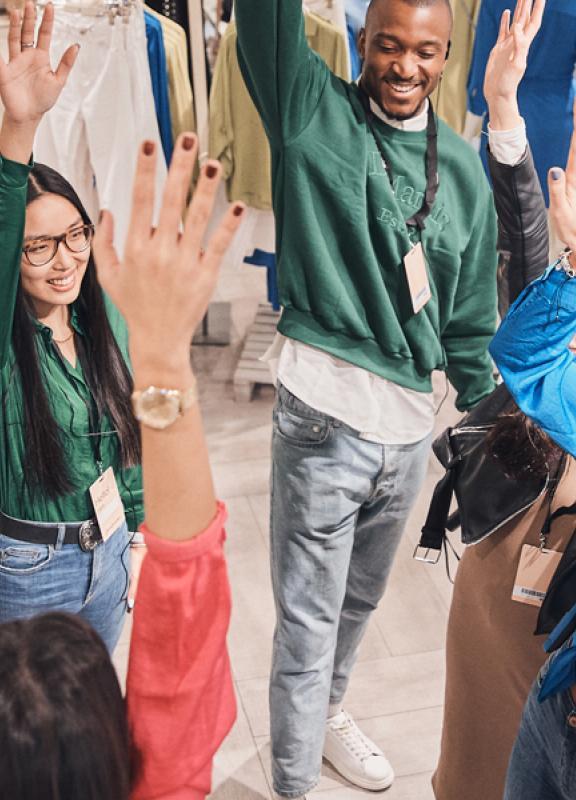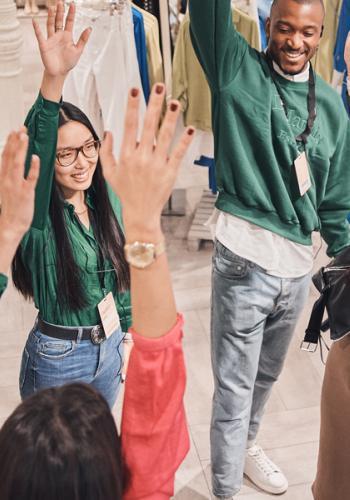
Diversity, inclusion, equality and work-life balance
At Inditex we are firmly convinced that one of our teams’ greatest strengths is their cultural plurality and diversity. We boast an inclusive corporate culture that fosters equal opportunities and takes a zero-tolerance stance towards all forms of discrimination.
Indeed, we have had a dedicated Diversity and Inclusion Policy since 2017, which we updated in 2020; it applies to anyone associated with the Group and its overriding purpose is to foster the creation of diverse and inclusive places to work.
To that end, we run a number of global initiatives. In 2021, for example, it is worth highlighting the rollout of the Diversity Charter, a European Commission equality initiative, at our subsidiaries in Greece, Portugal, Poland and Bulgaria as well as the office of our Belgian subsidiary, which had already been already endorsed at another eight of our European subsidiaries (France, Germany, Croatia, Romania, Slovenia, Italy, The Netherlands and Sweden).
In the US, we have been a member since 2019 of Open to All, a non-profit, non-discrimination campaign in which 50 fashion brands from all around the world participate. It is a coalition of companies that work to raise awareness and make visible the importance of protecting people from discrimination when they are in public retail spaces.
Our approach to diversity and equality is articulated around four cross-cutting priorities:
- Gender equality: cultivation of female talent has enabled us to help that talent rise our Company’s ranks. In 2021, 81% of our executive positions were held by women. During the last five years, female representation has increased substantially in our boardroom (+14 percentage points since 2016 to 36% in 2021).
- Inclusion of people with disabilities: in 2021 we directly employed 1,443 people with disabilities. At Inditex we are committed to facilitating their integration. We ensure that all our places of work adapt to their needs so as to guarantee autonomous use by people with disabilities or mobility problems.
- Inclusion of the LGBT+ community: Inditex is a member of organisations such as Open for Business and REDI which advocate for this community’s inclusion and rights. Last year we also rolled out projects for the workplace integration of transgender and non-binary people. In Spain, our Salta programme hired transgender people for our store and logistics teams and in the US we launched IN Pride to focus on the creation of job opportunities for this community. Our US subsidiary was recognised as one of the Best Places to Work for LGBT+ people in the Corporate Equality Index 2022 compiled by the Human Rights Campaign Foundation, which distinguishes the firms with the best LGBT+ community inclusion practices in 2021.
- Socio-ethnic inclusion: our Salta programme - which seeks to generate work opportunities for people at risk of marginalization - is active in 13 countries. Since 2008, 1,545 people have joined our store, logistics and factory teams thanks to this initiative. Two of the groups that have received strongest support through Salta are victims of domestic violence and refugees.
In recognition of that effort, since 2020 Inditex has been included in Refinitiv’s Diversity and Inclusion Index, which encompasses the 100 most diverse and inclusive organisations in the world. And for the third year running, the Group was selected by Bloomberg for inclusion in its Gender Equality Index (GEI). In addition, in 2021 Inditex was included in the Financial Times Diversity Leaders ranking, which lists the 850 leading companies in the field of diversity and inclusion in 16 countries.
On the talent development front, in 2020 Inditex set up the Women in Tech initiative in order to expand its inclusion values to the world of technology, specifically to encourage women to work in innovation and science. In 2021 we hosted numerous sessions and master classes to encourage women to pursue university studies in STEM subjects and increase female representation in digital and tech jobs.
To that end Inditex also fostered awareness and education drives. In addition to the goal of creating internal and external community with other groups and associations, we have set specific, measurable targets for internal and external recruitment and hiring.



